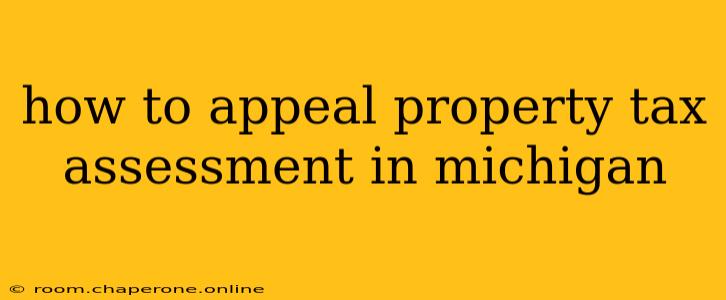Michigan property owners often find themselves questioning their property tax assessment. Feeling over-assessed is a common sentiment, leading many to explore the appeals process. This guide walks you through the steps involved in appealing your property tax assessment in Michigan, equipping you with the knowledge and strategies to successfully challenge an assessment you believe to be unfair.
Understanding Michigan's Property Tax Assessment System
Before diving into the appeals process, it's crucial to grasp how property assessments work in Michigan. Your property's assessed value forms the basis for calculating your property taxes. This assessment is supposed to reflect the property's market value – what it would reasonably sell for on the open market. However, inconsistencies and errors can occur, leading to over-assessments.
The assessment process is handled at the local level, typically by a county's assessing office or a tax assessing agency. These agencies utilize various methods to determine market value, including comparable sales analysis (looking at recent sales of similar properties), cost approaches (estimating construction costs), and income approaches (analyzing potential rental income).
Grounds for Appealing Your Property Tax Assessment
You have grounds to appeal your property tax assessment if you believe the assessed value is significantly higher than the market value of your property. This might be due to:
- Obvious Errors: Incorrect property details (square footage, lot size, features) are common reasons for appeals. Thoroughly review your assessment notice and compare it to your property records.
- Inaccurate Comparable Sales: If the assessor used inappropriate comparable properties (different size, condition, location) to justify the assessment, this is a valid reason to appeal.
- Market Value Discrepancy: Provide evidence demonstrating that your property's market value is lower than the assessed value. This requires strong supporting documentation.
- Inequitable Assessment: If you believe your property is assessed at a higher rate than similar properties in your neighborhood, you can argue inequitable assessment. This requires demonstrating similar properties with lower assessments.
- Changes in Property Value: If your property’s value has decreased due to damage, market shifts, or other factors, you can appeal for a reduced assessment.
Steps to Appeal Your Property Tax Assessment in Michigan
The appeals process varies slightly by county, but the general steps remain consistent:
1. Review Your Assessment Notice Carefully
Start by thoroughly reviewing your property tax assessment notice. Identify any discrepancies or inaccuracies in the details of your property. This is your foundation for building your appeal.
2. Gather Supporting Documentation
This step is crucial. You need compelling evidence to support your claim. This might include:
- Recent appraisals: A professional appraisal conducted by a licensed appraiser will be your strongest evidence.
- Comparable sales data: Compile information on recent sales of similar properties in your neighborhood. Include addresses, sale prices, dates, and details of the properties.
- Photos: If your property has suffered damage or has features different from what the assessment reflects, photos can be helpful.
- Property improvement records: If you've made recent renovations or improvements that haven't been reflected, provide relevant documentation.
3. File Your Appeal Form
Contact your local assessing office or tax assessing agency to obtain the necessary appeal form. This form typically requires detailed information about your property and the reasons for your appeal. Complete the form accurately and thoroughly, and attach all supporting documentation. Ensure you meet the deadline for filing the appeal. Missing the deadline can result in your appeal being rejected.
4. Attend the Hearing (if necessary)
After filing your appeal, you may be scheduled for a hearing before a Board of Review. Prepare your case meticulously, presenting your evidence clearly and concisely. Be prepared to answer questions from the board members. Consider bringing a friend or professional to assist you.
5. Understand the Outcome
After the hearing (or if the appeal is handled administratively), you'll receive a decision regarding your appeal. The board might uphold the original assessment, partially reduce it, or grant a full reduction. If unsatisfied with the outcome, you may have options to pursue further appeals through the courts. Seek legal advice if you believe you have strong grounds for continued appeals.
Expert Advice and Legal Assistance
Navigating the property tax appeal process can be complex. For complex cases or situations where significant discrepancies exist, consulting with a qualified property tax attorney or real estate professional is highly recommended. They can provide guidance tailored to your specific circumstances and significantly increase your chances of a successful appeal.
By following these steps and diligently gathering evidence, Michigan property owners can effectively appeal their property tax assessments and ensure they're paying a fair share of taxes. Remember, proactive preparation and a well-documented appeal are key to success.

